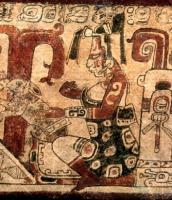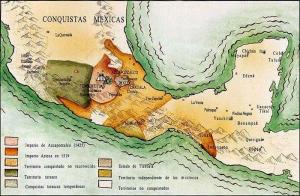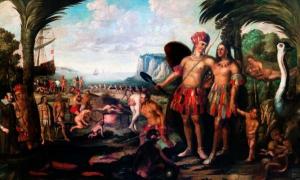GERMANY and BERLIN Division
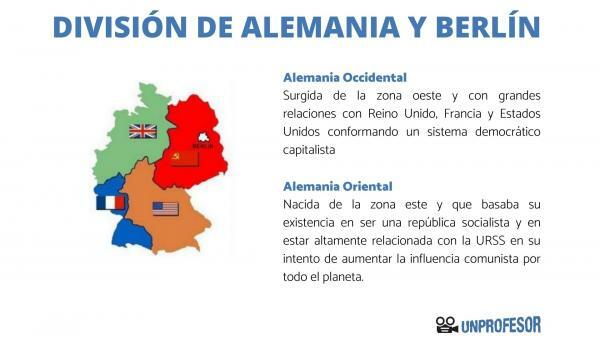
After World War II, the world faced an uncertain future, in which many things were going to change due to new influences from the USSR and the loss of Nazism. One of the great changes took place in the great loser of World War II, Germany, causing her defeat a series of changes that are vital to understanding Europe in the 20th century. To understand these great changes in this lesson from a teacher we offer you a summary of the division of Germany and Berlin.
When talking about the division of Germany and Berlin we refer to a period of German history understood between 1945 and 1990. This process started after World War II made the German nation split in two large blocks known as the East and west in which life was very different.
After the war, Germany lost many of the gains that it had achieved thanks to its numerous victories, at the same time that part of its new territories were ceded to other countries such as the USSR. The German population became very strange, being made up largely of people from abroad, Germans returning from exile suffered during the war, and by millions of prisoners of war who for years had to serve to restore the damage that World War II had caused in dozens of countries.
During the first years after the war, the voice of the Germans counted for little and the division was made with more in mind the interests of the Allies than in German life itself. That was why the German nation was divided into:
- The West Germany emerged from the west and with great relationships with United Kingdom, France and United States shaping a capitalist democratic system
- And the call East Germany born from the eastern zone and based its existence on being a socialist republic and being highly related to the USSR in their attempt to increase communist influence across the planet.
The division of Berlin and its wall
While the division of Germany was in two blocks, the same did not happen with Berlin that after Hitler's defeat divided into four zones, each being governed by the United Kingdom, the United States, France and the USSR. The four divisions followed the same process as the region, being first divided into the eastern and western zones and later into West Germany and East Germany.
It was in 1961 that to end the constant steps between regions the Berlin Wall was created that separated both areas.

Image: Infobae
To continue with this lesson on division of Germany and Berlin - summary, we need to understand the reasons and the subsequent importance of the division that took place in Germany and Berlin and therefore it is necessary to talk about the causes and the consequences that were related to this important historical event, in order to better understand this complex process in history European.
Causes of the division of Germany
Although generally speaking about the causes that led to the division of Germany we all think about them, we must understand which were more than we thought, and therefore in this section we must talk about both the best known and others as well relevant. The main causes of the German division are as follows:
- The defeat of Germany in 1945 that led to the victory of the Allies and the occupation of the entire German region, ending for years with German freedom.
- The Potsdam conference, in which the main Allies reached a series of agreements on the future of Germany, among which was the division of the Germanic region and the organization of each zone for a nation.
- The contrary ideologies West German and East German changes meant that the changes in both regions were too great to that both could be reunited, especially because of the great differences between the capitalism of one and the socialism of the other.
- Creation of the Berlin Wall to separate both regions and that it was almost impossible to pass from one to the other, its existence being a symbol of the division.
- Emergence of a Cold War between the United States and the USSR which made it necessary for Germany to have to divide to suit the interests of both regions.
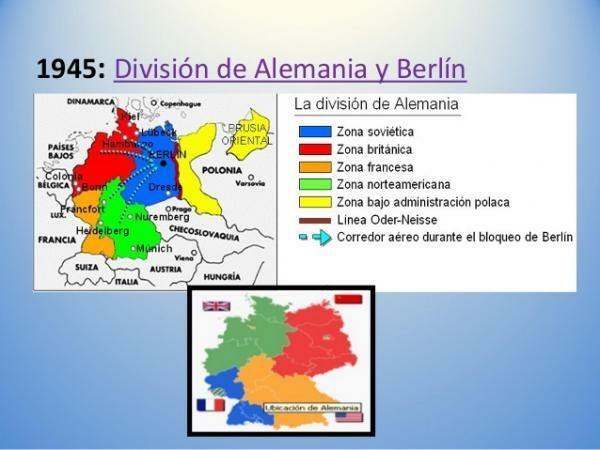
Image: Slideshare
On the other hand, we must talk about the main consequences that had the division of Germany, since something as complex as the ideological partition of a nation in the end does not fail to bring an enormous amount of consequences of greater or lesser relevance. The main consequences of the division of Germany are the following:
- The division of Germany into West Germany o Federal Republic of Germany and in East Germany o Democratic Republic of Germany.
- Numerous locks between both regions both by road and with an air blockade so that it was impossible to change the nation.
- Capital pass from West Germany to the city of Bonn, which remained until the union of both regions.
- Great ideological contrast between both regions, betting one on capitalism and the other on socialism.
- Numerous Germans killed or detained for thinking of changing region or for trying.
- Great helps from United States and the USSR your new allies.

